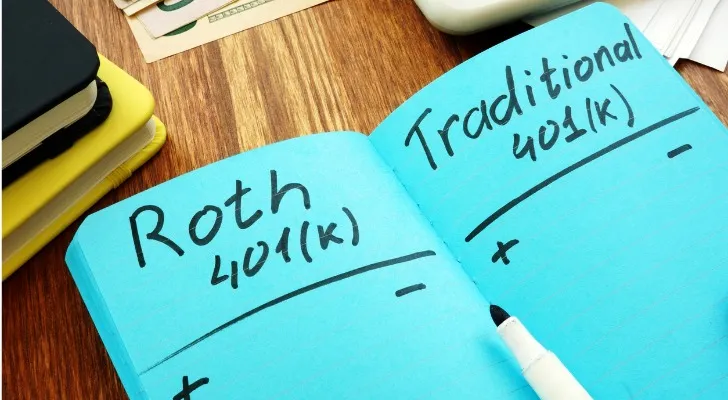I have an after-tax 401(k) that I would like to roll over to a Roth IRA with Schwab. Experts at Schwab say it can be rolled over to a Roth IRA without paying any taxes. I think they are wrong as I will still have to pay taxes on the earnings and capital gains accumulated over the years. I have talked to two other fiduciary financial planners and they are also leaning toward Schwab thinking.
What do you advise? It will be an in-service rollover as I am 82 and still working full time. I also have a pre-tax 401(k) that I am not planning to roll over yet. Thanks in advance for your invaluable help.
– Brahma
Contributions and the earnings they generate are not taxed when you roll over a Roth 401(k) directly to a Roth IRA. However, if your employer made pre-tax matching contributions, you would need to roll those funds into a traditional IRA or pay income taxes on them as part of a Roth conversion. In addition, the five-year rules would apply to the Roth IRA account, which could result in taxes on withdrawals if they were made before then. (Planning for retirement can be complicated, but working with a financial advisor can help you take control of the process.)
How Roth 401(k)s Work

Roth 401(k)s are employer-based retirement plans funded with money you’ve already paid income tax on. Contributions to Roth 401(k) accounts are subject to annual IRS maximums. In 2024, you can contribute up to $23,000 to a 401(k), plus an extra $7,500 if you’re 50 or older. You can participate in a Roth 401(k) no matter how much money you make.
The money in your Roth 401(k) grows tax-free. You won’t pay any taxes on earnings or gains within the account. When you retire, all withdrawals will be tax-free long as they’re qualified distributions. To count as a qualified distribution:
- It has to be at least five years since you made the first contribution. Opening the account doesn’t start the five-year clock if you don’t put money in at that time.
- You have to be at least 59 ½ years old or disabled.
- If any of the conditions aren’t met, the account earnings – but not your original contributions – will be taxable on withdrawal.
(If you need help deciding between a traditional pre-tax 401(k) and a Roth 401(k), consider talking it over with a financial advisor.)
Roth 401(k)s and Employer Matches
Before the SECURE Act 2.0 was passed in December 2022, employers could only make pre-tax matching contributions to their employees’ Roth 401(k) accounts. So, the employee would make after-tax contributions to their own accounts, and the employer would match those with pre-tax dollars. SECURE 2.0 allows for employers to make matching contributions directly into their employees’ Roth 401(k) accounts.
That choice is up to the employer to make. They can choose to make pre-tax matches, after-tax matches or forgo matching contributions altogether. It’s important to know what kind of matching is in place because it will affect several things including:
- Your current income taxes
- Your income taxes in retirement
- Potential tax issues when you roll over your Roth 401(k) into a Roth IRA
If your employer offers pre-tax matching, that money and any growth attached to it will be taxed on withdrawal. If your employer chooses to make matching Roth contributions, you’ll get a Form 1099-R for that amount for the tax year in which the contribution is actually made. For example, if your employer matches your 2024 contributions but not until January 2025, you will get the 1099-R for tax year 2025. The amount on the 1099-R gets added to your taxable income for that year. (If you run into tax questions concerning your employer matches, consider seeking out a financial advisor with tax planning expertise.)
Rolling Over a Roth 401(k) to a Roth IRA

It’s easy to roll over your Roth 401(k) into a Roth IRA. First, you need to have a Roth IRA in place to accept the rollover. Then, all you have to do is ask your 401(k) provider to complete a direct rollover, where they send the money from your Roth 401(k) electronically into your Roth IRA.
Doing a direct rollover allows you to avoid the mandatory income tax withholding – usually 20% – that applies when you receive a check from your plan administrator. This is known as an indirect rollover. If you do get a check, you’ll have 60 days to deposit the full amount of the rollover into your Roth IRA to avoid tax consequences. That means you’ll have to replace the amount that’s withheld for taxes or risk that portion being considered a non-qualified distribution, triggering income taxes and possibly a 10% early withdrawal penalty.
If your account includes any pre-tax money, such as employer matches, you’ll have to pay income tax on those funds if you roll them into a Roth IRA. You also have the option of rolling those pre-tax funds into a traditional IRA to avoid a current tax bill. (A financial advisor can help you decide whether rolling retirement savings over into an IRA makes sense for you.)
The Five-Year Rule
Keep in mind that Roth accounts come with a five-year lock period. To clinch all the tax benefits of the Roth account, it must open for at least five years. The clock starts with the first contribution into the Roth account.
If you roll your Roth 401(k) into a Roth IRA, the five-year clock switches to the Roth IRA. For example, if you had a Roth 401(k) for seven years and rolled it over into a newly established Roth IRA in 2024, you’d have to wait until 2029 to take qualified withdrawals. But if the receiving Roth IRA has already been open and funded for four years, you’d only have to wait one more year to satisfy this five-year rule.
(However, there are more than one five-year rule and they can be tricky to navigate. Having a financial advisor in your corner can help you better understand these rules and avoid the tax consequences of breaking them.)
Bottom Line
You shouldn’t owe any taxes if you do a direct rollover of a Roth 401(k) into a Roth IRA. If you think your Roth 401(k) may contain pre-tax funds (such as employer matches), you’ll owe income taxes on the money if you choose to roll it over into the Roth IRA. You can also transfer those funds into a traditional IRA and preserve their tax-deferred status. However, consult a financial professional for the best way to handle that portion of your retirement money.
Retirement Planning Tips
- A financial advisor can potentially help you plan and save for retirement. Finding a financial advisor doesn’t have to be hard. SmartAsset’s free tool matches you with up to three vetted financial advisors who serve your area, and you can have a free introductory call with your advisor matches to decide which one you feel is right for you. If you’re ready to find an advisor who can help you achieve your financial goals, get started now.
- Are you on track to retire with enough money to support your needs? SmartAsset’s retirement calculator can help you estimate how much your savings could be worth by the time you retire, as well as how much annual income your portfolio can generate.
- Keep an emergency fund on hand in case you run into unexpected expenses. An emergency fund should be liquid – in an account that isn’t at risk of significant fluctuation like the stock market. The tradeoff is that the value of liquid cash can be eroded by inflation. But a high-interest account allows you to earn compound interest. Compare savings accounts from these banks.
Michele Cagan, CPA, is a SmartAsset financial planning columnist and answers reader questions on personal finance and tax topics. Got a question you’d like answered? Email AskAnAdvisor@smartasset.com and your question may be answered in a future column. Questions may be edited for length and clarity.
Please note that Michele is not a participant in the SmartAsset AMP platform.
Photo credit: ©iStock.com/designer491, ©iStock.com/designer491, ©iStock.com/Inside Creative House
